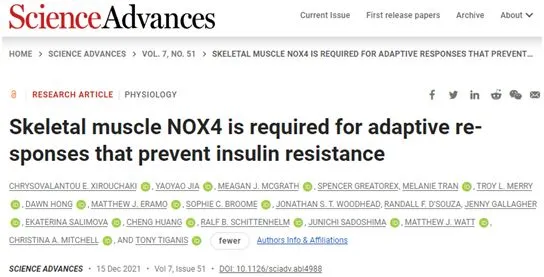Science Advances: Why does exercise prevent insulin resistance?
- Why Lecanemab’s Adoption Faces an Uphill Battle in US?
- Yogurt and High LDL Cholesterol: Can You Still Enjoy It?
- WHO Releases Global Influenza Vaccine Market Study in 2024
- HIV Infections Linked to Unlicensed Spa’s Vampire Facial Treatments
- A Single US$2.15-Million Injection to Block 90% of Cancer Cell Formation
- WIV: Prevention of New Disease X and Investigation of the Origin of COVID-19
Science Advances: Why does exercise prevent insulin resistance?
- Red Yeast Rice Scare Grips Japan: Over 114 Hospitalized and 5 Deaths
- Long COVID Brain Fog: Blood-Brain Barrier Damage and Persistent Inflammation
- FDA has mandated a top-level black box warning for all marketed CAR-T therapies
- Can people with high blood pressure eat peanuts?
- What is the difference between dopamine and dobutamine?
- How long can the patient live after heart stent surgery?
Science Advances: Why does exercise prevent insulin resistance?
In a new study, researchers from Monash University in Australia discovered an enzyme called NADPH oxidase 4 (NOX4), which is the key to exercise to improve our health.
Importantly, this discovery provides the possibility to develop drugs that promote the activity of this enzyme in order to protect people from the effects of aging on metabolic health.
The relevant research results were published in the Science Advances journal on December 15, 2021, with the title of the paper “Skeletal muscle NOX4 is required for adaptive responses that prevent insulin resistance“.

The proportion of people over 60 in the world will double in the next 30 years. By 2031, there will be more than 6 million Australians over 65. The incidence of type 2 diabetes increases with age, so this aging population will also lead to an increase in the incidence of the disease worldwide.
One of the main reasons why the incidence of type 2 diabetes increases with age is insulin resistance-the body’s inability to respond to insulin, and this is often caused by a decrease in physical activity with age of.
However, the exact mechanism by which non-exercise promotes insulin resistance has always been a mystery.
In this new study, these authors discovered how physical activity actually enhances insulin responsiveness and, in turn, promotes metabolic health.
Importantly, the enzymes they discovered that play a key role in this mechanism may be targeted by drugs to prevent the consequences of aging, such as muscle atrophy and diabetes .
These authors revealed that the reduction of skeletal muscle reactive oxygen species (ROS) during aging plays an important role in the production of insulin resistance.
According to the corresponding author of the paper, Professor Tony Tiganis of the Institute of Biomedical Discovery at Monash University, skeletal muscles constantly produce ROS, and they increase during exercise.
He said, “Exercise-induced ROS drives adaptive responses, and these responses are indispensable for the health-promoting effects of exercise.”
In this paper, Tiganis and his team showed how an enzyme called NOX-4 is essential for exercise-induced ROS and the adaptive response that drives metabolic health.

The production of hydrogen peroxide triggered by NOX4 in skeletal muscle is necessary for mitochondrial biogenesis. Picture from Science Advances, 2021, doi:10.1126/sciadv.abl4988.
In mice, these authors found that NOX4 increases in skeletal muscles after exercise, which then leads to an increase in ROS, triggers an adaptive response, and protects mice from insulin resistance, which would otherwise appear with aging or diet-induced obesity Insulin resistance.
Importantly, these authors found that the level of NOX4 in skeletal muscle is directly related to age-related decline in insulin sensitivity. Professor Tiganis said, “In this study, we found that in animal models, the abundance of skeletal muscle NOX4 decreases with aging, which leads to a decrease in insulin sensitivity.”
He said, “The use of compounds to trigger the activation of the NOX4 coordinated adaptive mechanism may improve key aspects of aging, including the production of insulin resistance and type 2 diabetes .
One of these compounds is naturally occurring, for example, in cruciferous vegetables. Medium, such as broccoli or cauliflower, although the amount needed for anti-aging effects may exceed the amount many people are willing to consume.”
Reference:
Chrysovalantou Xirouchaki et al. Skeletal muscle NOX4 is required for adaptive responses that prevent insulin resistance. Science Advances, 2021, doi:10.1126/sciadv.abl4988
Science Advances: Why does exercise prevent insulin resistance?
(source:internet, reference only)
Disclaimer of medicaltrend.org
Important Note: The information provided is for informational purposes only and should not be considered as medical advice.



